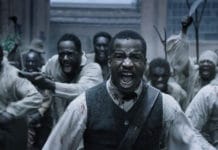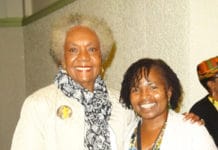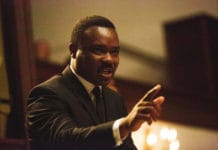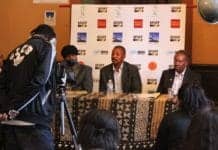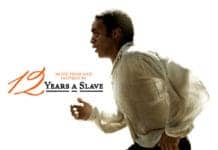by Wanda Sabir
Russell Maroon Shoatz is out of solitary confinement! Hugo Pinnell had his first contact visit in 40 years last weekend. Kiilu Nyasha announced this wonderful news at a reception following the second public hearing on solitary confinement called by Assemblyman Tom Ammiano, Feb. 11.
 Robert H. King, Free Angola 3, was also in San Francisco that week along with representatives from Amnesty International’s England office and Teenie Miller, the widow of slain 23-year old Angola prison guard Brent Miller, whom Herman Wallace of the Angola 3 was accused of killing in1974. She has denounced the accusation publicly and was in conversation with Robert King about this, freeing Albert Woodfox, the last of the Angola 3 still in prison, and justice Louisiana-style on Feb. 26. See http://solitarywatch.com/tag/tom-ammiano/.
Robert H. King, Free Angola 3, was also in San Francisco that week along with representatives from Amnesty International’s England office and Teenie Miller, the widow of slain 23-year old Angola prison guard Brent Miller, whom Herman Wallace of the Angola 3 was accused of killing in1974. She has denounced the accusation publicly and was in conversation with Robert King about this, freeing Albert Woodfox, the last of the Angola 3 still in prison, and justice Louisiana-style on Feb. 26. See http://solitarywatch.com/tag/tom-ammiano/.
Is Orange the New Black? Who are California Women Prisoners?
Congratulations to the California Coaltion for Women Prisoners and Justice Now for a wonderful, inspiring and heart rending program with phenomenal panelists, among them Misty Rojo and Piper Kerman, activist and author of the popular Netflix series, “Orange Is the New Black.” The Humanist Hall was full to capacity as women on stage and via recorded interviews and others in the audience – many recently released after 10-15-20-plus years – spoke of their experiences behind the bars in California’s prisons.
One panelist, whom I’d met at Valley State Prison, was incarcerated as a teen; now 35, she was released just a month or so earlier. I met many women and a man in the audience, who were also recently emancipated. Moderated by Shanelle Matthews, ACLU Northern California, the women spoke of imprisonment’s effect on family stability, health, both mental and physical, and how despite this mistreatment and attempt to break their spirits, they kept rising. Visit womenprisoners.org.
“Cuntained: A Dance Party Extravaganza Benefiting CCWP,” is March 15, 3-8 p.m. at El Rio, 3158 Mission St., San Francisco, $5-$100 sliding scale.
Salute to Amiri Baraka
It is a traditional African belief that a person never dies until there are none among the living to remember him. Sunday, March 2, at 7 p.m. at The Emerald Tablet, 80 Fresno St., San Francisco, is a very special tribute to the great Amiri Baraka, featuring an unforgettable ensemble of poets and musicians that includes five of San Francisco’s six poets laureate.
The event is free with delicious complimentary food. Featured musicians include Nic Bearde (Jazz vocals), George Long (saxophone), Destiny Muhammad (harp/vocals), Colin O’Leary (guitar/vocals), Jorge Molina (traditional instrument/vocals) and Keenan Webster (Kora).
Poets include Dee Allen, Mahnaz Bahidian, Lincoln Bergman, Charlels Curtis Blackwell, Neeli Cherkovski, Boadiba, Diane Di Prima (Amiri’s daughter), Agneta Falk, Lawrence Ferlinghetti, Maketa Groves-Smith, Gary Hicks, Jack Hirschman, devorah major, Karen Melander Magoon, D. Scott Miller, David Meltzer, Alejandro Murguia, Dottie Payne, Ramu, Kevin Simmonds and Michael Warr. This event is sponsored by ArtInternationale! Art Lounge, The Emerald Tablet and the Revolutionary Poets Brigade.
Black Arts Movement Conference Feb. 28-March 2
Also March 1-2 weekend, beginning Friday, Feb. 28, at a free reception, is the historic convening of a who’s who among Black Arts Movement poets and artists, at UC Merced. Register at https://www.facebook.com/events/206503536195057/.
International Day in Solidarity with the Haitian People
Commemorate the 10th anniversary of the 2004 coup, celebrate Haiti’s revolution, Saturday, March 1, 5:30 to 8:30 p.m., at the Humanist Hall, 390 27th in Oakland. The featured speaker is Paulette Joseph, coordinator of the grassroots women’s organization Oganizasyon Fanm Vanyan. OFV was founded in 1996 and has been active in the struggle for women’s rights, democracy and justice in Haiti. Vanyan in Creole means someone of principle, conviction, brave, strong, above all of moral character, steadfast in struggle. There will also be eyewitness reports, drums, film, food, music. Visit www.haitisolidarity.net.
Dance: Black Choreographers
Black Choreographers Festival Here and Now continues at Laney College and ODC in San Francisco. Congratulations to Kimara on his new book, a collection of photos of BCF (smile). Also congrats to all the awardees at the BCF Awards night, March 1 at Laney College, 900 Fallon, Oakland. Visit http://www.bcfhereandnow.com/.
Theatre: ‘The House That Will Not Stand’
Marcus Gardley’s ‘The House That Will Not Stand’ is at the Berkeley Rep through March 23.
Freedom is on Black folks’ minds throughout the Western Diaspora. Locally, Oakland-born nationally acclaimed playwright Marcus Gardley returns with another episode in the Black Diaspora saga. He takes us to New Orleans, not long after the Louisiana Purchase and the impact of this economic move on the politics of a household where Madam Beatrice (actress Lizan Mitchell), a free woman of color, holds court in the house of her master, Lazare (actor Ray Reinhardt), whom we meet when we enter the parlor – I mean theatre.
 Did I say free? Well, freedom is a product that one constantly has to negotiate the terms of in 1836. The terms were often bondage, a kind of sexual servitude with perks like inheritance or a benefits package prearranged. Called plaçage, these common law marriages were recognized as legal agreements under French law; however, when Thomas Jefferson purchased Louisiana at sale price, the deal connected to France’s need to liquidate. France was losing its war against enslaved Africans in Haiti under the leadership of Gens. Jean Jacques Dessalines, Toussaint Louverture, Henri Christophe and Alexandre Sabès Pétion.
Did I say free? Well, freedom is a product that one constantly has to negotiate the terms of in 1836. The terms were often bondage, a kind of sexual servitude with perks like inheritance or a benefits package prearranged. Called plaçage, these common law marriages were recognized as legal agreements under French law; however, when Thomas Jefferson purchased Louisiana at sale price, the deal connected to France’s need to liquidate. France was losing its war against enslaved Africans in Haiti under the leadership of Gens. Jean Jacques Dessalines, Toussaint Louverture, Henri Christophe and Alexandre Sabès Pétion.
Thereafter, the law changed, and with it the power wielded by African American women with such status. Elegant Madam Beatrice wants her three beautiful daughters to be free. This idea is contested by her master, who does not agree; neither do her daughters, who only know servitude, the type they have been reared to accept. They don’t understand that they are really as much enslaved as Makeda (Harriett D. Foy), who is working steadily towards a day when she will be free. A colorful and delightful character, she is about as focused as Madam and will not let anything or anyone dead or alive keep her from her goal.
In “The House That Will Not Stand,” this family of free women is juxtaposed against that of an enslaved woman, and Madam Beatrice’s sister, Marie Josephine (actress Petronia), who is kept locked up because she keeps trying to escape to go to Congo Square to dance to the rhythms of a blue-black drummer who has won her heart, a heart, when we meet her, she lost as a young girl.
Standing with a foot on both sides of the crossroads, Makeda loves the girls whom she helped raise and their mother whose plight she understands. “The House That Will Not Stand” is a metaphor, as are many elements in this play, which is beautiful to the eyes – costumes, set – as it is on the ears, original music to the story, which is not neatly packaged at the end and keeps one wondering. Skin color is as much an issue in this household as it is today. The three girls are all different hues – Agnès and Maude Lynn lighter complexioned than their sister Odette, who doesn’t notice this until she and her big sister become rivals. The three actresses, Joniece Abbott-Pratt as Odette, Flor De Liz Perez as Maude Lynn and Tiffany Rachelle Stewart as Agnès, whose portraits hang on the living room wall before we see the actual visions of loveliness approach from church with their mother singing, bring the reality of what to us is an impossible situation as they wrestle first with this father’s death, then with their mother’s unreasonable idea that they not go to the ball where eligible white men make bids on suitable Black girls.
 Directed by Patricia McGregor, one wonders what kind of world exists where slavery is preferred over freedom, where love is the first casualty when offered little choice for happiness? Bitterness fills the mouth of Beatrice who tries unsuccessfully to manage with dignity the fates of her girls; it litters the floor, falls from the magnolia tree, falls from the sky.
Directed by Patricia McGregor, one wonders what kind of world exists where slavery is preferred over freedom, where love is the first casualty when offered little choice for happiness? Bitterness fills the mouth of Beatrice who tries unsuccessfully to manage with dignity the fates of her girls; it litters the floor, falls from the magnolia tree, falls from the sky.
What kind of world exists where one assumes bondage is preferred to freedom? Caught, must Beatrice’s girls surrender, or are there unexplored options? I had a great interview with the elder women in the cast. Look for the broadcast late February, early March on Wanda’s Picks Radio. At that time I learned that the play has been extended to March 23, with performances Tuesdays-Sundays, at the Berkeley Repertory Theatre Thrust Stage, 2025 Addison at Shattuck, Berkeley. For tickets and information, contact (510) 647-2949, (510) 647-2949 and berkeleyrep.org. Half price tickets are available for anyone under 30 years of age; $10 discount for students and seniors one hour before curtain.
‘Love Don’t Hurt’
Love shouldn’t hurt, but often in dysfunctional circumstances or power relationships like slavery and neocolonialism, what masquerades as love destroys. Oakland is the epicenter for sexual trafficking, and a powerful community event at the East Oakland Youth Development Center last month, entitled “Love Don’t Hurt,” a community panel and discussion featured Regina Evan’s powerful Best of Bay Area Fringe 2013 award-winning play about sex-trafficking, “52 Letters,” and panelists who were victims, now emancipated, as well as young abolitionists, the Oakland city attorney and an Oakland Public School psychologist. The program, sponsored by EOYDC, Love Never Fails, Alpha Kappa Alpha Sorority Inc. and Oakland Public Schools, also had a panel following the play moderated by Vanessa Scott, director of Love Never Fails. The discussion was informative, passionate and horrifying as we learned first hand from the trafficked and abolitionists what sexual trafficking is, what can be done to both prevent child sexual trafficking and how to join the freedom movement.
Morehouse College President Dr. John Silvanus Wilson Jr. speaks on the ‘Cradle to Prison Pipeline’
Freedom continues as a theme when one looks at the tenure of Morehouse College’s 11th president, whom I had a great conversation with, alumnus Dr. John Silvanus Wilson Jr. Of all the Historic Black Colleges and Universities (HBCU), Morehouse is one that has a visibly long history of excellence. When I think about HBCUs, Howard University comes to mind because this is where the mother of DJ Spooky, composer of “Birth of a Nation Remix,” taught (smile). This is also where Kwame Ture (Stokely Carmichael) became politicized.
I also think about its medical center and the cutting edge work of its physicians there around HIV/AIDS research and care, not to mention the researcher whose work on Black DNA became what is now African Ancestry. Florida A&M is dear to my heart because of a wonderful conference I attended on the Hip Hop Nation, an example of a bloodless global coup. I know Dillard University in New Orleans because it has an English language exchange program for school teachers in Brazil developed by my friend Dr. Kimya Dawson-Smith, Xavier (also in New Orleans) because Paradise Free Jah Love (aka Richard Moore), who just celebrated an important birthday – Happy 60th! – played basketball there and my sister attended the institution for a short while.
I know Spelman because of the sisters who held a rap artist’s heels to the fire who’d dare denigrate Black women and expect praise. Alice Walker, while a student, met her friend and teacher, the late Howard Zinn, there. Wiley College is memorable for the great debate team which became the subject of a film directed by Denzel Washington. I know Lincoln University in Philadelphia because Gil Scott Heron attended there, as did Langston Hughes, Supreme Court Justice Thurgood Marshall, Althea Gibson and Arthur Ashe.
But there is something about Morehouse – maybe it’s David Roach or his Mo’ Betta Food, who represents his alma mater well here in the Oakland-San Francisco Bay that make me think so favorably about this institution (smile).
 Dr. Wilson, class of ‘79, is certainly of a caliber of man fitting of this institution that boasts much success in its graduates. From Philadelphia, the child of parents who also attended HBCUs, the president knew from an early age the power of an educated populace, especially Black men.
Dr. Wilson, class of ‘79, is certainly of a caliber of man fitting of this institution that boasts much success in its graduates. From Philadelphia, the child of parents who also attended HBCUs, the president knew from an early age the power of an educated populace, especially Black men.
While listening to his inaugural address in Atlanta, Feb. 14, 2014, and reading it more closely, I was impressed by his attention to our tradition of calling on the ancestors and his respect for women’s leadership later when he acknowledged his grandmother and mother, for their guidance and foresight prepared him to step into his current role once it became available. His impressive track record, beginning in 1985, speaks to his ability to develop capital for institutions he is connected to, such as MIT, where over a 16-year tenure he managed two record-breaking capital campaigns with combined results approaching $3 billion (https://www.morehouse.edu/about/presidentfranklin/presidentsbio.htm).
While at MIT, Dr. Wilson was also president of the Greater Boston Morehouse College Alumni Association (GBMCAA), which raised more than $1 million in support of scholarships and community outreach (https://www.morehouse.edu). Before he left there to take an appointment at George Washington University for eight years, as executive dean of the university’s Virginia campus and associate professor of higher education, he was given Morehouse College’s Benjamin Elijah Mays Leadership Award in 1998. The GBMCAA also established the John Wilson Leadership Award to recognize current Morehouse students who exhibit similar transformative leadership qualities (https://www.morehouse.edu).
So when Dr. Wilson called in his talk Feb. 14 for a shift in thinking from poverty to wealth, from making do to doing a whole lot better, this was no idle chatter.
In a phone interview a week after his historic speech, we spoke on an equally historic day, that of Malcolm X’s killing. Though we did not speak of this fact directly, we did talk about how apathy and low expectations make the cradle to prison pipeline trajectory for young Black men acceptable. Since when is it a sign of relief when a 65-70 percent high school dropout rate is a norm we can live with? He called on this “nation to commit itself to achieving his and President Obama’s goal of making a cradle-to-power pipeline real for Black men.”
As President Obama’s point person on HBCUs, he helped craft the new legislation unveiled Feb. 27 connected to subsequent symposiums to be held around the country, one in Oakland at Laney College. Dr. Ortiz, Chancellor of Peralta Community Colleges, said at the State the District Meeting this spring that our charge is to help African American men and Latino men complete their education, which means transfer and graduate. Right now the numbers are very low for both populations.
Dr. Wilson began his tenure as the 11th president of an institution where its namesake coined the term “talented tenth,” though Dr. W.E.B. DuBois popularized it. Morehouse College president’s sound plans are couched in a vision that seeks to develop Morehouse men from the inside out. Dr. Wilson wants the Morehouse model set by its students and alumni and staff to be a model of what it means to be a man imitated throughout the nation regardless of that man’s race.
 With degrees in liberal arts from Morehouse and in theology, education administration and policy from Harvard, Dr. Wilson taking office in January 2013 made it a seminal year for Black America – the 150th anniversary of the Emancipation Proclamation and the 50th anniversary of the March on Washington for Jobs and Freedom. In his February 2014 speech, he reflected on freedom and imagination.
With degrees in liberal arts from Morehouse and in theology, education administration and policy from Harvard, Dr. Wilson taking office in January 2013 made it a seminal year for Black America – the 150th anniversary of the Emancipation Proclamation and the 50th anniversary of the March on Washington for Jobs and Freedom. In his February 2014 speech, he reflected on freedom and imagination.
2013 was also the year the film “12 Years a Slave” was released, Samuel Northup’s story. Not politicized until sold into a system he hadn’t questioned until he experienced it first hand, any unexamined life could produce similar ambivalence to national events as long as such atrocities do not cast shadows across our doorsteps.
Not on Dr. Wilson’s watch though. He is a man who, as a student, voiced his displeasure with campus policies in a weekly column which echoed Dr. Mays’ book by a similar title, “Disturbed About Man.” “Disturbed about Morehouse” became the young Wilson’s column. As an undergraduate, he told Dr. Mays, then president, when asked, that he loved Morehouse but didn’t like everything about its policies and operation.
He quotes Dr. Howard Thurman, also a Morehouse man – yes, I know, impressive (smile) – who spoke of “progress as recovery,” recovery of a self one might not be proud of because one doesn’t know who he is. Dr. Wilson has been having students read certain books, character shaping material like Ayi Kwi Armah’s “The Beautiful Ones Are Not Yet Born” and, more recently, “The Warmth of Other Suns: The Epic Story of America’s Great Migration” by Isabel Wilkerson.
Dr. Wilson states: “One of the best things about this Morehouse experience has been our ability to help our students to answer that precious question at the heart of all education and all theology: Who am I?
“For years, at the center of our campus pedagogy has been the belief that the journey to a noteworthy, call-answered life starts with an authentic answer to that question, Who am I? Like few other institutions, Morehouse has understood that somewhere in each man’s answer must be what Howard Thurman called ‘the sound of the genuine.’
“Thurman said everyone must hear that sound, and if you hear it and do not heed it, it would have been better for you and the world had you never been born.”
“So how does the notion of beauty fit with this ‘sound of the genuine’? Langston Hughes speaks of beauty in his poem, ‘I too’:
I, too, sing America.
I am the darker brother.
They send me to eat in the kitchen
When company comes,
But I laugh,
And eat well,
And grow strong.
Tomorrow,
I’ll be at the table
When company comes.
Nobody’ll dare
Say to me,
“Eat in the kitchen,”
Then.
Besides,
They’ll see how beautiful I am
And be ashamed—
I, too, am America.
“Ayi Kwei Armah insists that we need more people who will not be so drunk with the wine of the world that they forget who and why they are. He says we need men who will live according to a different set of ideals and values and hopes.
“He might have said we need more Morehouse men!
“We just bought 2,000 copies of Armah’s book to ensure that every current Morehouse student will read it and commit to being a part of why, on this campus, the beautiful ones are shaped and reshaped every day.
“This new and beautiful embrace – a world-of-our-dreams embrace’ – is not for students alone. We need a new embrace of faculty and staff as well. And that won’t happen until more of us, through pure self-examination, first embrace the warning Dr. DuBois had for all of us when he said, ‘Unless we conquer our current vices, our current vices will conquer us!’
“So this is a war for preeminent values too!”
Visit wandaspicks.com for an expanded calendar. Don’t forget to tune into www.blogtalkradio.com/wandas-picks Wednesdays at 7 a.m. and Fridays at 8 a.m. PST.
Bay View Arts Editor Wanda Sabir can be reached at wsab1@aol.com. Visit her website at www.wandaspicks.comthroughout the month for updates to Wanda’s Picks, her blog, photos and Wanda’s Picks Radio. Her shows are streamed live Wednesdays at 6-7 a.m. and Fridays at 8-10 a.m., can be heard by phone at (347) 237-4610 and are archived on the Afrikan Sistahs’ Media Network.

 Store
Store



